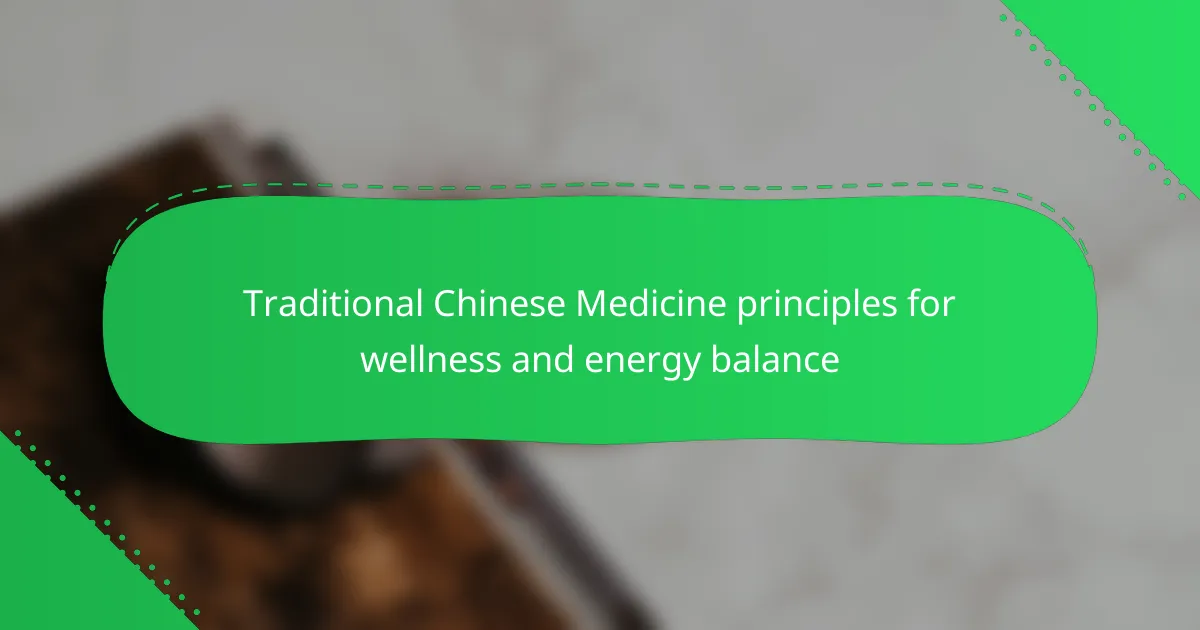Achieving wellness and energy balance is crucial for overall health. Traditional Chinese Medicine principles emphasize harmony through Yin and Yang, the Five Elements, and the flow of Qi. This article explores essential diagnostic methods, therapeutic modalities, and lifestyle practices that support energy equilibrium. Understanding these concepts can enhance your well-being and promote a balanced life.
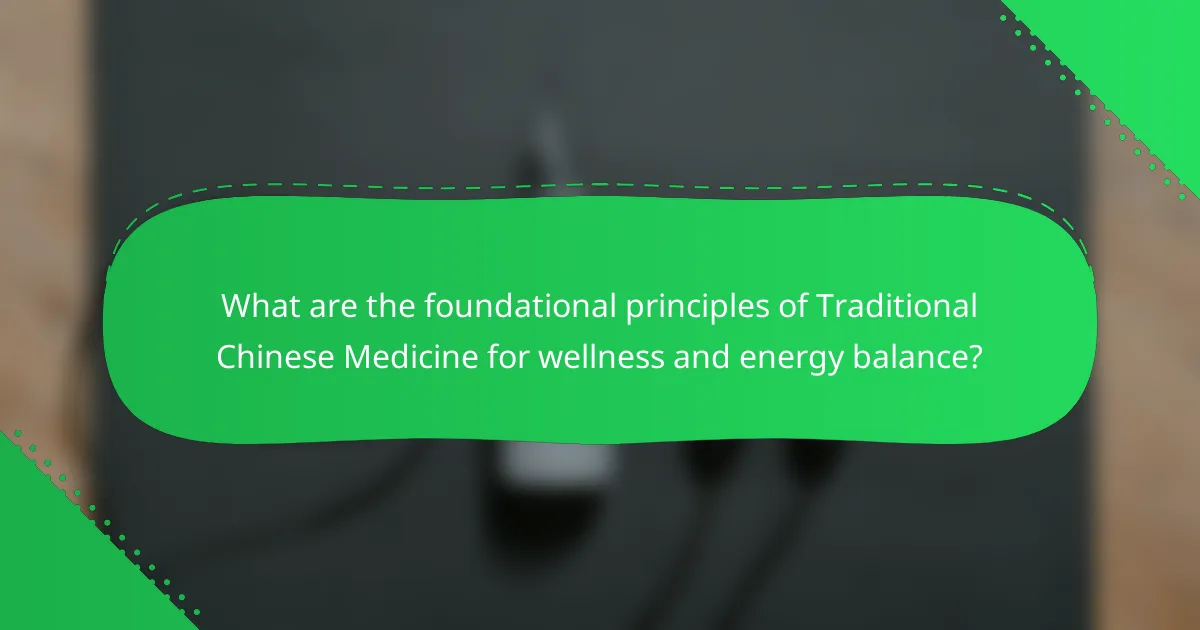
What are the foundational principles of Traditional Chinese Medicine for wellness and energy balance?
The foundational principles of Traditional Chinese Medicine focus on achieving wellness and energy balance through harmony in the body’s systems. These principles include the concepts of Yin and Yang, the Five Elements, Qi (vital energy), and the importance of balance in physical, emotional, and environmental factors.
Yin and Yang represent complementary forces that must be balanced for optimal health. The Five Elements—Wood, Fire, Earth, Metal, and Water—describe interactions and relationships within the body and nature, influencing health and energy flow. Qi is the life force that circulates through meridians, and its proper flow is essential for vitality.
Practices such as acupuncture, herbal medicine, and Qi Gong are utilized to restore balance and enhance energy. These methods aim to clear blockages, strengthen Qi, and promote overall wellness, reflecting the holistic approach of Traditional Chinese Medicine.
How does Qi influence health and vitality?
Qi significantly influences health and vitality by promoting energy balance and harmony within the body. In Traditional Chinese Medicine, Qi is viewed as the vital life force that flows through meridians, impacting physical and mental well-being.
A balanced Qi contributes to optimal organ function, enhances immunity, and supports emotional stability. For instance, practices like acupuncture and tai chi are designed to restore Qi flow, leading to increased energy levels and reduced stress.
Research indicates that individuals with balanced Qi report higher vitality and resilience against illnesses. Maintaining Qi through lifestyle choices, such as diet and exercise, is essential for overall wellness.
Understanding and harnessing Qi can empower individuals to take control of their health, fostering a holistic approach to vitality.
What role do Yin and Yang play in energy balance?
Yin and Yang are essential for maintaining energy balance in Traditional Chinese Medicine. They represent opposing forces that complement each other, ensuring harmony within the body. When Yin and Yang are in equilibrium, energy flows smoothly, promoting overall wellness. Imbalances can lead to physical and emotional ailments, highlighting their critical role in health practices. Understanding these principles helps individuals achieve better energy regulation and holistic health.
How does the Five Elements theory contribute to wellness?
The Five Elements theory significantly enhances wellness by promoting balance and harmony in the body. Each element—Wood, Fire, Earth, Metal, and Water—corresponds to specific organs and emotions, influencing overall health. For example, Wood relates to the liver and anger, while Water connects to the kidneys and fear. This interconnectedness helps identify imbalances and guide treatment strategies in Traditional Chinese Medicine. By addressing these elements, individuals can achieve energy balance, resulting in improved physical and emotional well-being.
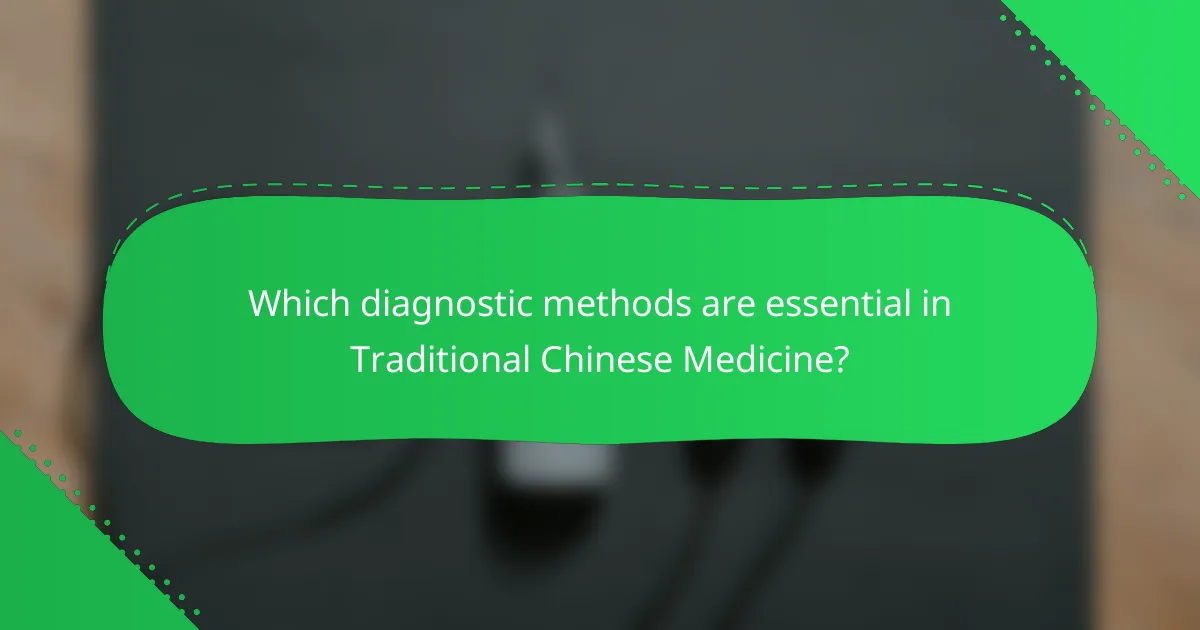
Which diagnostic methods are essential in Traditional Chinese Medicine?
Essential diagnostic methods in Traditional Chinese Medicine include pulse diagnosis, tongue diagnosis, and observation of symptoms. These methods assess energy balance and overall wellness.
Pulse diagnosis evaluates the quality and rhythm of the pulse to determine organ health. Tongue diagnosis observes the tongue’s color, shape, and coating for insights into internal conditions. Observation of symptoms involves analyzing physical and emotional signs to guide treatment.
These methods reflect the holistic approach of Traditional Chinese Medicine, emphasizing the interconnectedness of body, mind, and spirit.
What are the key signs and symptoms assessed in a TCM diagnosis?
Key signs and symptoms in Traditional Chinese Medicine (TCM) diagnosis include tongue appearance, pulse quality, and emotional state. TCM practitioners assess these indicators to evaluate energy balance and overall wellness.
Tongue appearance reveals color, shape, and coating, indicating internal conditions. Pulse quality includes depth, strength, and rhythm, reflecting organ health. Emotional state connects to energy flow, revealing stress or imbalance. These assessments guide treatment strategies for restoring harmony.
How do pulse and tongue diagnosis reflect internal health?
Pulse and tongue diagnosis provide insights into internal health by reflecting the body’s energy and organ function. In Traditional Chinese Medicine, pulse diagnosis assesses the quality, rhythm, and strength of the pulse, revealing imbalances in organ systems. Tongue diagnosis evaluates color, shape, and coating, offering clues about the state of internal organs and overall vitality. These diagnostic methods emphasize the interconnectedness of physical and emotional health, guiding practitioners in creating personalized wellness strategies. By observing these attributes, practitioners can identify root causes of health issues and tailor treatments to restore energy balance effectively.
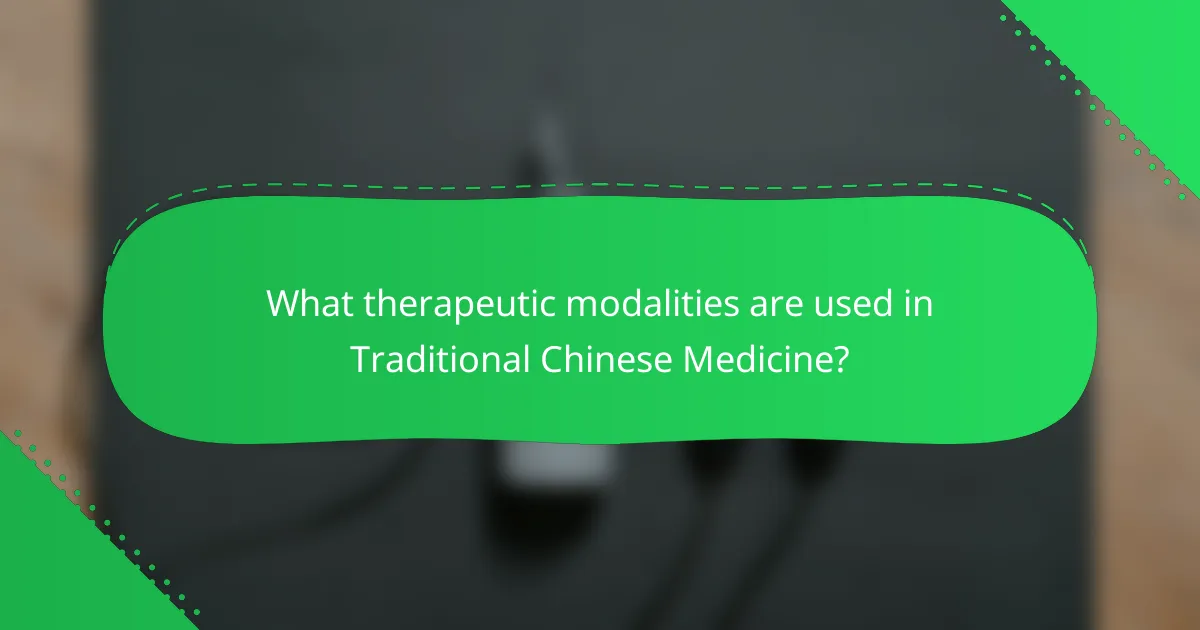
What therapeutic modalities are used in Traditional Chinese Medicine?
Traditional Chinese Medicine employs various therapeutic modalities to promote wellness and energy balance. Key modalities include acupuncture, herbal medicine, tai chi, and qigong.
Acupuncture involves inserting fine needles into specific points to restore energy flow. Herbal medicine utilizes natural plants to address various health conditions. Tai chi is a gentle martial art focusing on slow, flowing movements that enhance physical and mental well-being. Qigong combines movement, meditation, and controlled breathing to cultivate energy and improve health.
These modalities are rooted in the principles of balance and harmony within the body, emphasizing the interconnectedness of physical, emotional, and spiritual health. Each modality offers unique benefits, contributing to overall wellness and energy equilibrium.
How does acupuncture support energy balance?
Acupuncture supports energy balance by stimulating specific points on the body, promoting the flow of Qi. This practice aligns with Traditional Chinese Medicine principles, which emphasize harmony between body and mind. Acupuncture can enhance circulation, reduce stress, and improve overall vitality. As a result, it helps restore equilibrium, addressing both physical and emotional aspects of wellness.
What are the benefits of herbal medicine in TCM?
Herbal medicine in Traditional Chinese Medicine (TCM) offers numerous benefits for wellness and energy balance. It promotes holistic healing by addressing the root causes of ailments, enhancing overall vitality, and restoring harmony within the body.
Herbal remedies can improve digestion, boost immunity, and reduce stress. They often contain unique compounds that support specific health conditions, such as inflammation or fatigue. For instance, ginseng is renowned for its energizing properties, while chrysanthemum is valued for its calming effects.
Moreover, herbal medicine helps maintain energy balance by aligning with TCM principles of yin and yang. This balance is crucial for optimal health and prevents the development of chronic diseases. Regular use of herbal medicine can lead to long-term wellness benefits, making it a valuable component of a comprehensive health strategy.
How do dietary practices in TCM enhance wellness?
Dietary practices in Traditional Chinese Medicine (TCM) enhance wellness by promoting energy balance, harmony, and holistic health. TCM emphasizes the consumption of seasonal, local foods to align with natural rhythms. This approach supports the body’s Qi, or vital energy, which is essential for overall well-being.
In TCM, food is categorized by its energetic qualities, such as warming or cooling effects. For example, warming foods like ginger boost circulation and digestion, while cooling foods like cucumber reduce inflammation. This balance helps maintain internal harmony and prevents illness.
Additionally, TCM incorporates the concept of food as medicine. Specific foods are believed to target particular organs or systems, enhancing their function. For instance, goji berries are known for their benefits to the liver and eyes.
Lastly, mindful eating practices, such as chewing thoroughly and eating in a calm environment, are encouraged. These habits promote better digestion and absorption of nutrients, further supporting wellness.

Which lifestyle practices are recommended for maintaining energy balance?
Traditional Chinese Medicine emphasizes balanced lifestyle practices to maintain energy. Key recommendations include regular physical activity, balanced nutrition, adequate sleep, stress management, and mindfulness techniques.
1. Engage in moderate exercise like Tai Chi or Qi Gong to promote energy flow.
2. Consume a balanced diet rich in whole foods, focusing on seasonal and local ingredients.
3. Prioritize sleep hygiene to ensure restorative rest, aiming for 7-9 hours per night.
4. Utilize stress-reduction techniques such as meditation or acupuncture to enhance emotional balance.
5. Practice mindfulness to cultivate awareness of energy levels and overall well-being.
What role does Tai Chi play in promoting wellness?
Tai Chi promotes wellness by enhancing energy balance and reducing stress. It embodies Traditional Chinese Medicine principles, focusing on harmony between mind and body. Regular practice improves flexibility, strength, and mental clarity. Research indicates that Tai Chi can lower anxiety levels and improve overall mood. Additionally, it fosters social connections, contributing to emotional well-being.
How does meditation contribute to energy balance in TCM?
Meditation enhances energy balance in Traditional Chinese Medicine (TCM) by harmonizing the body’s Qi. It fosters relaxation, reduces stress, and promotes mental clarity, which are essential for maintaining equilibrium.
In TCM, energy balance is crucial for overall wellness. Meditation supports this by facilitating the flow of Qi through meridians, enhancing vitality. Regular practice can strengthen the body’s resilience against imbalances caused by emotional or physical stressors.
Moreover, studies indicate that meditation can improve sleep quality, further contributing to energy restoration. This practice aligns with TCM principles that emphasize the importance of rest and recovery for optimal energy levels.
In summary, meditation serves as a powerful tool in TCM for achieving energy balance, promoting holistic health, and enhancing overall well-being.
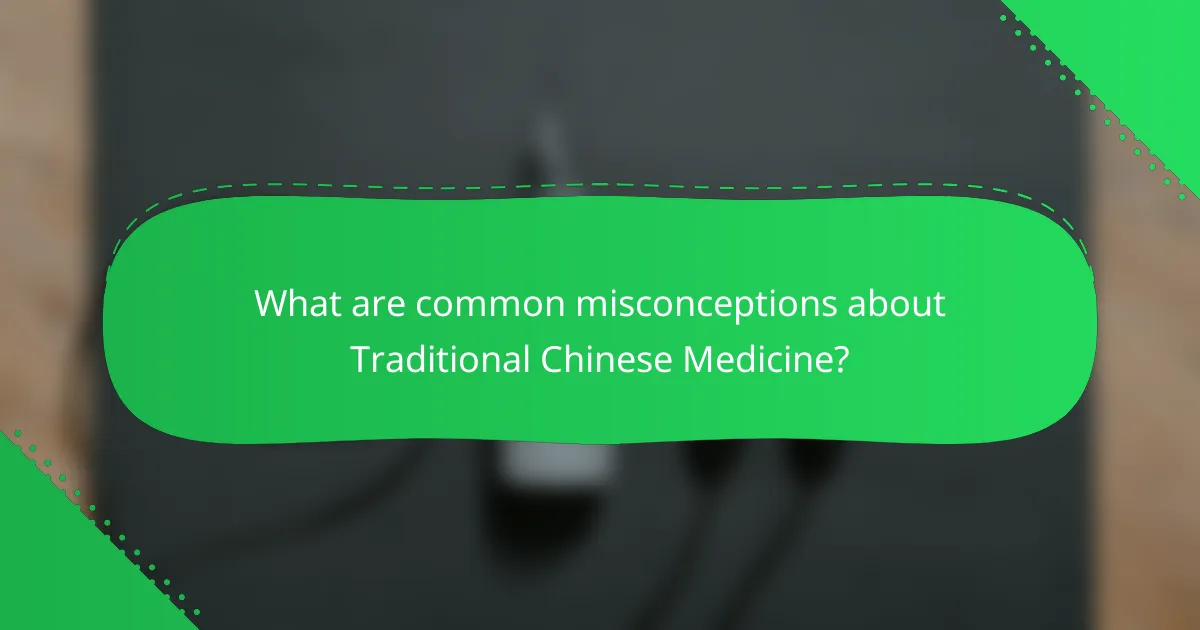
What are common misconceptions about Traditional Chinese Medicine?
Common misconceptions about Traditional Chinese Medicine include the belief that it solely relies on herbal remedies. In reality, it encompasses a variety of practices such as acupuncture, dietary therapy, and Qi Gong. Many people also think TCM lacks scientific backing; however, numerous studies support its effectiveness in promoting wellness and energy balance. Another misconception is that TCM is only for chronic conditions, while it can also enhance overall health and prevent illnesses. Lastly, some individuals assume TCM is a quick fix; in truth, it often requires a holistic approach and time for optimal results.
Why do some people doubt the efficacy of TCM?
Some people doubt the efficacy of Traditional Chinese Medicine (TCM) due to a lack of scientific validation. Critics often point to the reliance on anecdotal evidence and the subjective nature of its practices. TCM principles focus on energy balance and holistic wellness, which can seem abstract compared to conventional medicine. Additionally, cultural differences and varying levels of practitioner training contribute to skepticism. As a result, those unfamiliar with TCM may question its effectiveness in addressing health issues.
How can TCM complement Western medicine approaches?
Traditional Chinese Medicine (TCM) can effectively complement Western medicine by promoting holistic wellness and energy balance. TCM principles emphasize the interconnectedness of body, mind, and spirit, enhancing overall health outcomes.
TCM utilizes techniques such as acupuncture and herbal medicine to address imbalances in the body’s energy, or Qi. These practices can alleviate symptoms and support recovery from various conditions, often enhancing the effectiveness of Western medical treatments. For instance, acupuncture has been shown to reduce pain and improve recovery times post-surgery.
Moreover, TCM’s focus on prevention aligns well with Western medicine’s growing emphasis on proactive health management. By integrating lifestyle modifications, dietary recommendations, and stress management techniques, TCM contributes to long-term wellness strategies. This synergy can lead to improved patient satisfaction and holistic care.
In summary, TCM’s principles of energy balance and holistic wellness offer valuable support to Western medical approaches, fostering a comprehensive healthcare experience.
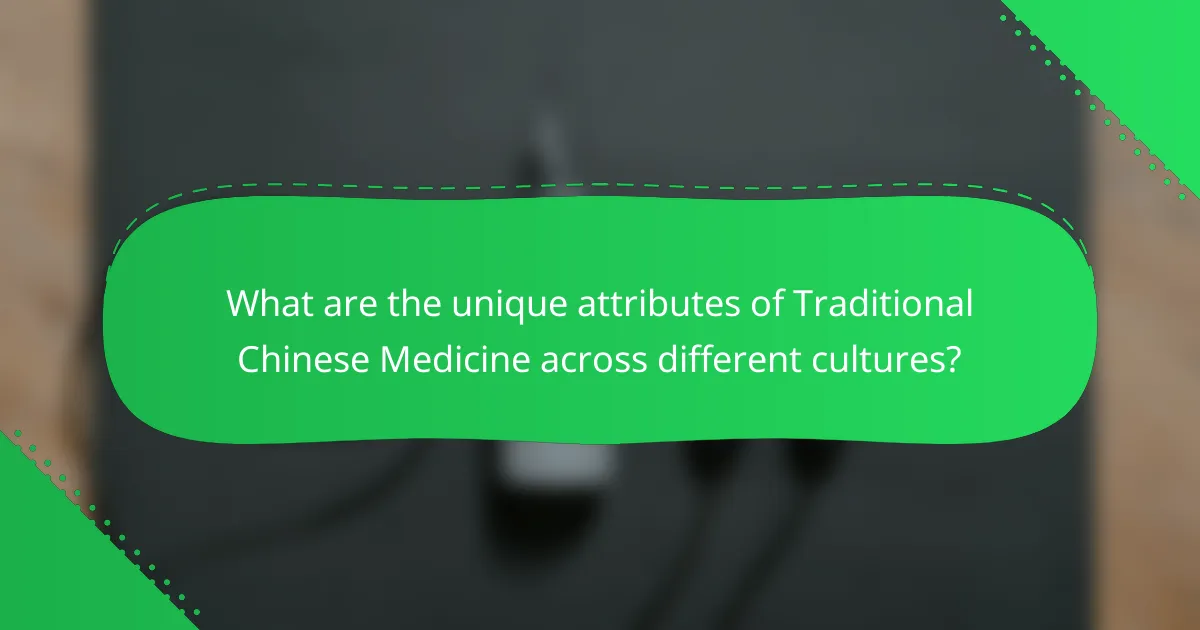
What are the unique attributes of Traditional Chinese Medicine across different cultures?
Traditional Chinese Medicine (TCM) exhibits unique attributes across cultures, emphasizing holistic wellness and energy balance. Its principles, such as Yin-Yang and Qi, adapt to diverse cultural contexts, influencing local health practices.
In Western cultures, TCM’s herbal remedies and acupuncture gain popularity for their natural approach. In contrast, in Southeast Asia, TCM integrates with local traditions, enhancing community health practices.
Unique attributes include TCM’s focus on prevention, personalized treatment plans, and the balance of body, mind, and spirit. These elements differentiate TCM from conventional Western medicine, which often prioritizes symptom treatment over holistic wellness.
Rarely, TCM incorporates spiritual practices like meditation and Tai Chi, which further enrich its cultural adaptability and promote energy balance.
How is TCM perceived and practiced in different regions?
Traditional Chinese Medicine (TCM) is perceived and practiced differently across regions, influenced by local culture and healthcare systems. In China, TCM is integrated into mainstream healthcare, emphasizing holistic wellness and energy balance. Practitioners utilize acupuncture, herbal remedies, and dietary therapy to promote harmony within the body.
In Western countries, TCM is often viewed as complementary medicine. Many individuals seek acupuncture for pain relief or stress management, appreciating its non-invasive nature. However, skepticism exists regarding its scientific basis, leading to varied acceptance.
In Southeast Asia, TCM shares prominence with local traditional practices. Countries like Vietnam and Malaysia incorporate TCM principles into their health systems, blending them with indigenous healing methods. This fusion enhances community trust and accessibility.
In contrast, regions with limited exposure to TCM may view it as an alternative therapy, often relying on conventional medicine. The lack of awareness and understanding can hinder its acceptance, despite growing interest in natural and holistic approaches to health.
What cultural adaptations of TCM exist in modern wellness trends?
Modern wellness trends incorporate Traditional Chinese Medicine (TCM) principles by emphasizing holistic health and energy balance. Practices like acupuncture, herbal remedies, and Qi Gong have gained popularity for their focus on restoring harmony within the body.
Wellness retreats often integrate TCM techniques, promoting mindfulness and stress reduction. Moreover, dietary adjustments inspired by TCM principles, such as seasonal eating and balancing yin and yang foods, are increasingly embraced.
The rise of wellness apps reflects TCM’s influence, offering guided meditations and personalized health insights based on ancient practices. These adaptations demonstrate TCM’s relevance in contemporary health and wellness landscapes.
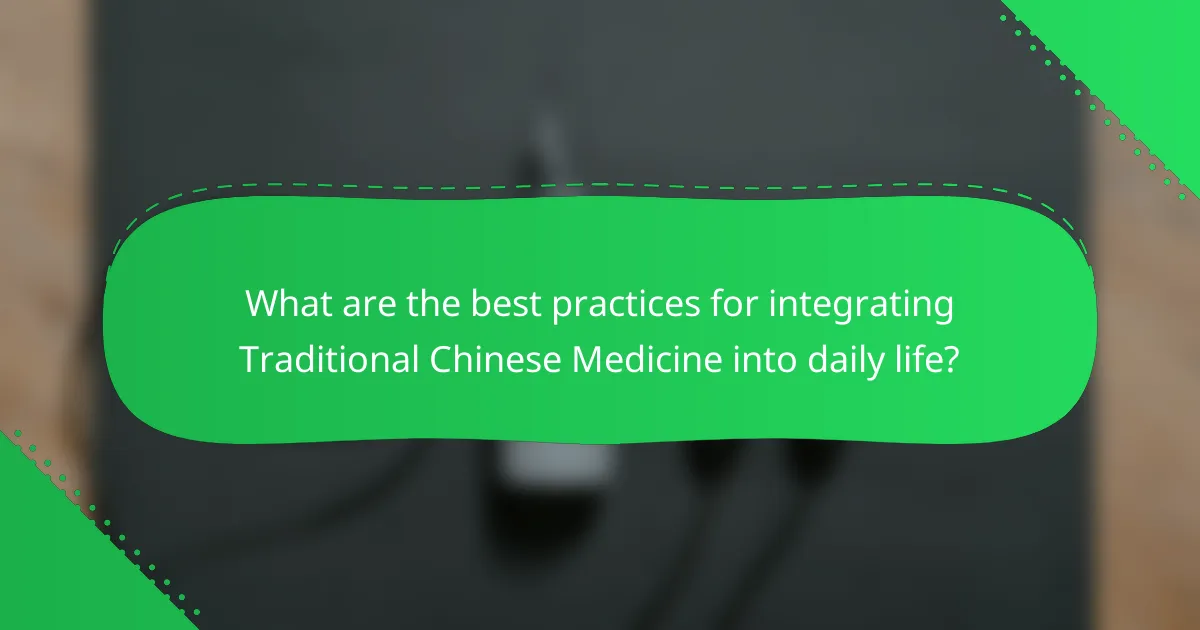
What are the best practices for integrating Traditional Chinese Medicine into daily life?
Integrating Traditional Chinese Medicine (TCM) into daily life enhances wellness and energy balance. Key practices include maintaining a balanced diet, incorporating herbal remedies, practicing mindfulness, and engaging in regular physical activity like tai chi or qigong.
1. Prioritize a balanced diet rich in whole foods, seasonal produce, and appropriate flavors to support energy flow.
2. Use herbal remedies tailored to individual needs, focusing on those that promote vitality and harmony.
3. Practice mindfulness through meditation or breathing exercises to reduce stress and enhance mental clarity.
4. Engage in physical activities, such as tai chi or qigong, to cultivate energy and improve overall health.
These practices align with TCM principles, fostering a holistic approach to well-being.
What common mistakes should be avoided when starting TCM practices?
Avoid common mistakes such as neglecting holistic principles, overlooking individual differences, and disregarding diet’s role in Traditional Chinese Medicine practices.
Failing to consider the interconnectedness of body, mind, and spirit can lead to ineffective treatments. Each person’s unique constitution requires tailored approaches; a one-size-fits-all methodology often fails. Ignoring dietary recommendations, which are foundational to TCM, can hinder energy balance and overall wellness.
Additionally, rushing the learning process can lead to misunderstandings of core concepts. Ensuring a solid grasp of TCM principles before applying them is crucial for effective practice.
How can one effectively combine TCM with other wellness approaches?
Integrating Traditional Chinese Medicine (TCM) with other wellness approaches enhances energy balance. Focus on holistic practices like yoga, meditation, and nutrition to complement TCM principles.
For example, combining acupuncture with mindfulness meditation can deepen relaxation and promote energy flow. Additionally, incorporating herbal remedies into a balanced diet can optimize health benefits.
Engaging in tai chi alongside conventional exercise routines fosters physical and mental harmony. Such combinations leverage the strengths of each approach, creating a comprehensive wellness strategy.
Overall, blending TCM with other methods cultivates a well-rounded path to energy balance and holistic health.
